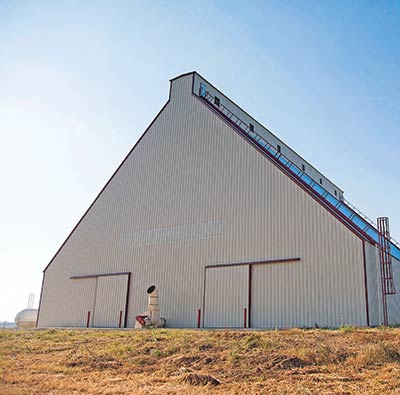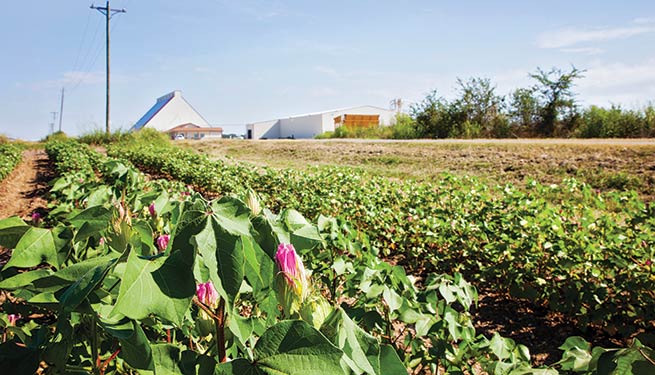
Photo by Debra Ferguson/Southern Images
Two years ago, cotton producers in northeastern Mississippi had an enviable dilemma: Their high cotton yields outpaced the nearest cotton gin's handling capacity. When the gin rejected their offer to help fund expansion, the farmers had only one option left — to build their own gin.
On paper, the multimillion-dollar solution looked daunting. Undeterred, a core group of six men pooled their resources and contacted Mississippi Land Bank. Could the rural lending cooperative make them a loan? Within a few days, they had their answer: Affirmative.
Higher Prices Fuel Production
In years past, most farmers in Noxubee, Lowndes and surrounding counties raised mostly soybeans and corn. But as cotton prices rose, more and more shifted to growing irrigated cotton. From 2009 to 2011, cotton production in the area doubled to 42,000 bales. The huge increase overwhelmed the outdated gin they used 50 miles away — so much, in fact, that the small operation didn't finish ginning the fall 2011 harvest until January 2012.

Bogue Chitto Gin members are pleased that the gin produced 43 to 45 bales per hour in its first season. Pictured here with two Land Bank employees are Glenn Mast, front; and from left to right, second row, Paul Graber and Brad Judson; third row, Rodney Mast, Joe Huerkamp and Jack Huerkamp; back row, Bill Skinner, Doug Dahlem, Gin Manager Jay Hoover, and the Land Bank's Bart Harris and Tyler Anderson.
Photo by Debra Ferguson/Southern Images
What would cotton farmers in the area do come the next fall? Local seed salesmen had already sold enough cotton seed in the area to plant 20,000 acres, the equivalent of 40,000 or so bales.
In early March, farmer Glenn Mast and several of his employees attended the annual Mid-South Farm and Gin Show in Memphis, Tenn. There, they toured booths and visited with vendors, most notably those with Cherokee Fabrication, the maker of high-tech cotton gins.
“We were desperate to do something in time for fall picking,” Glenn recalls. “And the Cherokee folks were very accommodating. After we got home, a rep called me the following Tuesday and asked if we'd talked with other farmers yet. No, I told him. Thursday, he called back and told me that, if we'd commit soon, Cherokee could build us a gin in time for our 2012 harvest.”
Five days later, the Cherokee representative met with Glenn, his son Rodney and four other farmers — Paul Graber, Rodney McGill, and brothers Jack and Joe Huerkamp. The next day, March 14, Rodney Mast flew the group in his private plane to Monette, Ark., to see a Cherokee Magnum 244, a high-speed, computer-driven machine capable of running up to 30 bales per hour. For the Mississippi farmers, a similar gin would cost more than $6 million, which meant that they would need at least $900,000 for a down payment.
On the return flight home, feelings were mixed. “How are we going to get the money?” Jack lamented. “We can't get that much.”
“Jack,” Glenn replied, waving his hand at the other men, “the six of us can come up with half of it right here.”
“Well,” Jack grinned, “then maybe we can build us a gin.”
“The meeting was euphoric! We had farmers show up that we'd never expected would come, let alone be investors.” - Glenn Mast
Full Steam Ahead
On March 15, the group sat down with Bart Harris and Tyler Anderson at the Mississippi Land Bank office in Starkville to discuss a loan and hammer out preliminary terms.
“As soon as we heard about their idea, we were in!” recalls Bart, assistant vice president. “Some of the farmers were already longtime customers, so we knew their history and financial positions.”
Afterward, the six farmers hurriedly contacted other cotton producers in the area and invited them to a preliminary meeting with Cherokee representatives. Bart and Tyler were invited to attend, in addition to an attorney and a certified public accountant.
The next morning, Glenn and Rodney Mast brewed coffee and arranged chairs, couches and tables in their old vacated tractor store. By the time the meeting started, more than 50 people had filled the storeroom.
“The meeting was euphoric!” Glenn says. “We had farmers show up that we'd never expected would come, let alone be investors. Cherokee told us that if we could get a $200,000 down payment, then they'd order the equipment and get the gin started. When I voiced that to the group, four farmers immediately pledged $50,000 each.”
It wasn't long before enough cotton farmers had raised their hands to back the project as solid investors. For his share of stock, one agreed to trade a site for the gin and seed warehouse. With documents in hand, the two lenders headed back to their Starkville office. They had a lot of work to do.

Photo by Debra Ferguson/Southern Images
Gin Becomes Reality
For eight days, the two hunkered down in a boardroom, crunching numbers and compiling credit work-ups. “We had stacks and stacks of paperwork on each customer,” Bart recalls. “We used easels to keep up with all the names. Plus, we had to work fast to get the loan approved so the farmers could get their down payment to Cherokee and start construction.”
The Land Bank staff's diligence paid off. On March 23 — just 20 days after the initial conversation with Cherokee — 25 cotton producers pledged a total of $1.6 million toward the new Bogue Chitto Gin, named after a local river. (In Choctaw, Bogue Chitto — pronounced bo-ga chi-ta — means “big creek.”) Of that amount, $1.1 million went to construction costs, and $500,000 paid for module trucks, trailers, forklifts and other necessary equipment.
The deal closed on April 19, and construction on the two-stand gin broke ground in May. Although it was slated to go online in mid-September, construction glitches kept the gin from cranking up until late October.

Farmer and gin stockholder Jack Huerkamp, left, says that the Bogue Chitto Gin wouldn't have been built without the help of Mississippi Land Bank. At right is Land Bank Assistant Vice President Bart Harris.
Photo by Sheryl Smith-Rodgers
By season's end, the gin had processed 35,964 cotton bales. “We had some start-up issues and a big learning curve,” says Jay Hoover, gin manager and stockholder. “But we had a good year overall. We averaged 43 to 45 bales per hour. We're looking forward to the new harvest season and starting on time. We expect to hit 45 to 50 bales per hour, too.”
No matter how well cotton harvests go, stockholders don't expect to see any monetary return on their stock investment for at least 10 years. “The new gin is here to make money for our growers now and in the long run,” Glenn explains. “But we do hope in the future to generate income for investors.”
New Land Bank Customers
Stockholder Jack Huerkamp, a lifelong farmer, got out of the cotton business in the late 1980s when the tobacco budworm decimated his plants. But better pest control practices and pivot irrigation lured him back. Now the new gin will make cotton farming even easier for him and others.
“The big difference this fall will be that the gin will be ready when our cotton's ready,” he says. “Plus, we have a concrete slab for storing our modules so they will stay in better condition.”
After the gin loan went through, Jack, his brother Joe and his son Brandon took out their own first-time loans with the Mississippi Land Bank. So did seven other stockholders. “We didn't know the Land Bank before, so the gin loan made the cooperative more visible in this county,” Jack says.
“If it wasn't for the Mississippi Land Bank,” he adds, “this project wouldn't have happened. The Bogue Chitto Gin wouldn't have been built if they hadn't stepped in and helped us.”